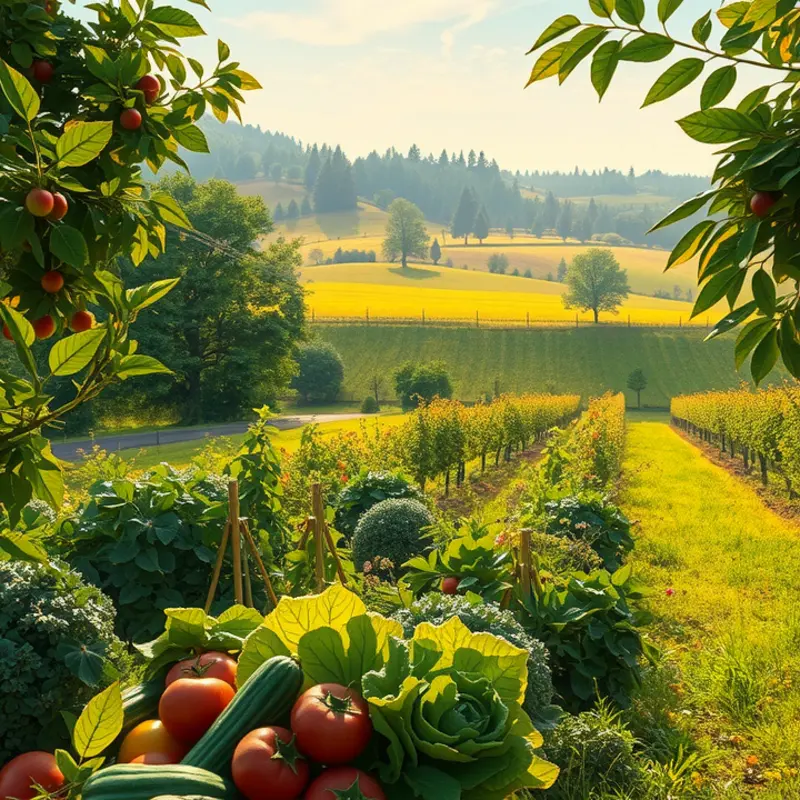Embracing sustainability in your diet not only benefits your health but also plays a crucial role in protecting our planet. By making conscious food choices, you can contribute to reducing carbon footprints, conserving water, and protecting biodiversity. This comprehensive guide offers practical tips for environmentally-conscious individuals eager to make eco-friendly dietary choices while still enjoying delicious and nutritious meals.
Choosing Fruits and Vegetables: Fresh and Local is Key

Fruits and vegetables form the core of a sustainable diet, offering a plethora of nutrients while maintaining a low carbon footprint. Prioritizing local and seasonal produce can drastically reduce transportation emissions, contributing to a greener lifestyle. By shopping at local farms or farmers’ markets, you directly support farmers in your community. This not only boosts local economies but also ensures less energy is expended in transporting goods.
Choosing organic and pesticide-free options helps protect biodiversity. Intensive farming practices often rely heavily on chemicals that can harm local ecosystems and biodiversity. By opting for organic produce, you support farming methods that maintain soil health and protect local wildlife. Reducing pesticide usage also means fewer chemicals leaching into water supplies and damaging aquatic life.
Navigating grocery stores and farmers’ markets with sustainability in mind requires a bit of strategy. Start by prioritizing the produce section over processed goods. Look for signs or labels indicating local produce, which might be distinguished by specific areas in-store or from inquiries with local farmers and vendors. These simple acts of mindfulness can promote choices that align with eco-friendly philosophies.
Experiencing the joy of growing your own fruits and vegetables at home can be transformative. Cultivating a home garden is a gratifying way to reduce your carbon footprint. Even small spaces like balconies can host pots of tomatoes or herbs. This not only ensures the freshness of your produce but also reduces packaging waste. Home gardening can be an engaging way to deepen your connection to the food you consume.
Maintaining the freshness of your harvested or purchased produce is key to minimizing waste. You can explore practical food storage techniques such as those discussed in eco-smart kitchen storage. By properly storing fruits and vegetables, their lifespan is extended, and wastage is reduced, further promoting sustainability.
By focusing on local, seasonal, and organic options, you contribute to a system that values environmental health. This mindful selection of fruits and vegetables supports not only your well-being but also the health of the planet. As you make these choices, remember the broader impact you’re having: nurturing not just yourself, but also the world around you.
Mindful Protein Choices: Rethinking Meat and Alternatives

The environmental footprint of our food choices is significant, with the protein on our plates contributing a substantial share. Adopting more sustainable diets can mitigate climate change, conserve water, and preserve biodiversity. Meat production, especially from industrial systems, results in high greenhouse gas emissions and substantial water use. Therefore, reducing meat consumption is a crucial step towards sustainability.
Plant-based proteins offer a promising alternative, both nutritionally and environmentally. Lentils, beans, and chickpeas are rich in essential nutrients like fiber, iron, and protein. Unlike meat, these legumes require significantly less water and fertilizer, making them more eco-friendly. Incorporating them into your diet is simple and beneficial. For instance, replace ground beef in tacos with lentil or chickpea filling, or enjoy a hearty bean stew instead of a meat-heavy stew.
When choosing meat, opt for sources that align more closely with eco-friendly practices. Grass-fed and pasture-raised meat typically have a smaller environmental impact compared to factory-farmed options. They promote soil health, enhance biodiversity, and often have a better nutritional profile. However, these options should still be consumed in moderation.
Processed meats are another area to address. They often contain additives and have a higher carbon footprint due to processing and preservation methods. Minimizing their consumption not only benefits environmental health but also supports personal health by reducing exposure to high sodium levels and preservatives linked to various diseases.
Meal prepping can serve as a powerful tool to incorporate sustainable proteins into daily meals. Allocate some time each week to prepare meals that emphasize plant-based proteins. For instance, cook a large pot of lentils that can be used in salads, soups, and wraps throughout the week. Exploring diverse recipes ensures that meals remain exciting and nutritionally balanced. Check out these minimal prep dinner ideas for inspiration on how to efficiently work with healthier protein sources without spending hours in the kitchen.
Embracing mindful protein choices doesn’t mean eliminating meat entirely; rather, it’s about creating a balanced approach that respects both our nutritional needs and the planet. By choosing sustainable protein sources, we can enjoy delicious, nutritious meals that support the earth’s well-being.
Final words
Adopting eco-friendly diet practices not only contributes to a healthier planet but also enhances personal well-being. By making intentional choices regarding fruits, vegetables, and protein sources, every meal can become a step towards sustainability. Supporting local farms, reducing meat consumption, and growing your own produce are actionable steps anyone can take. Every small change adds up, leading to significant long-term benefits for the environment. Remember that being environmentally conscious is a journey; every eco-friendly choice is a victory toward preserving our planet.








